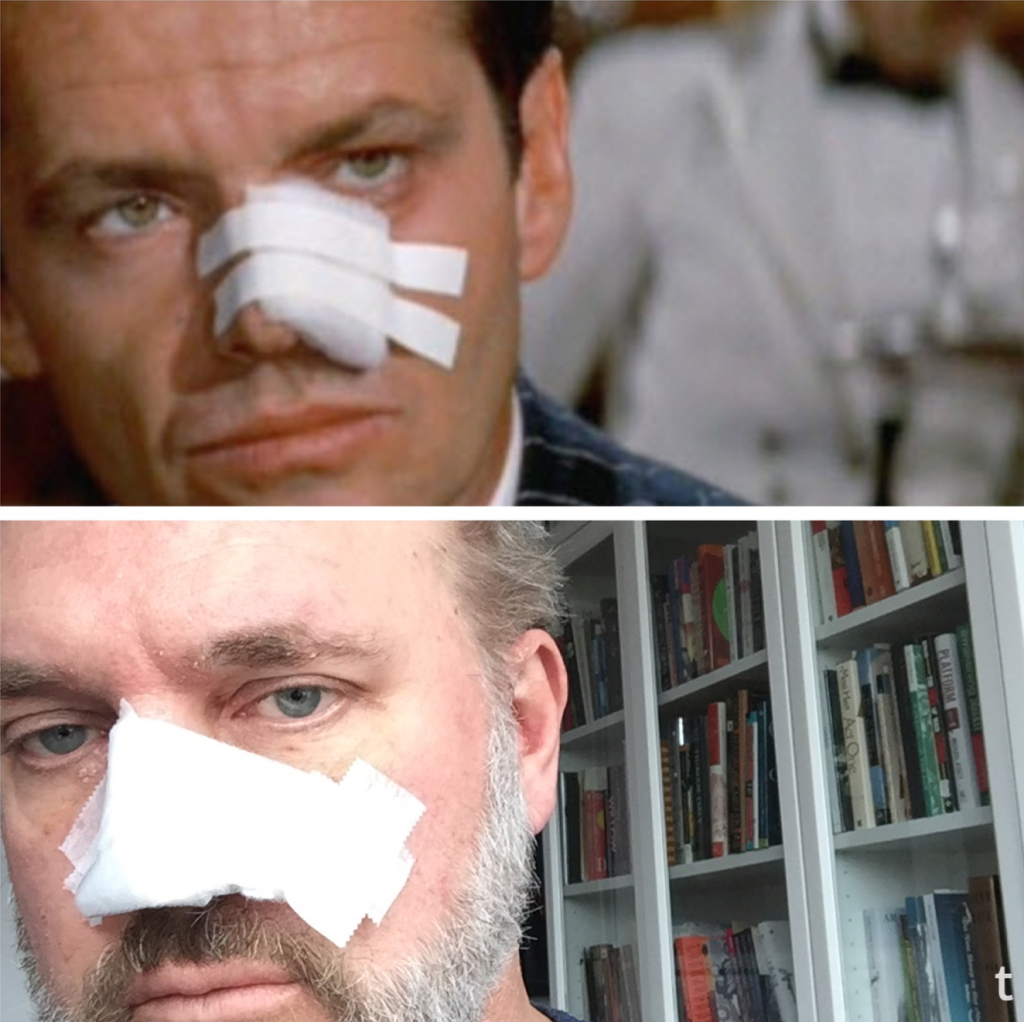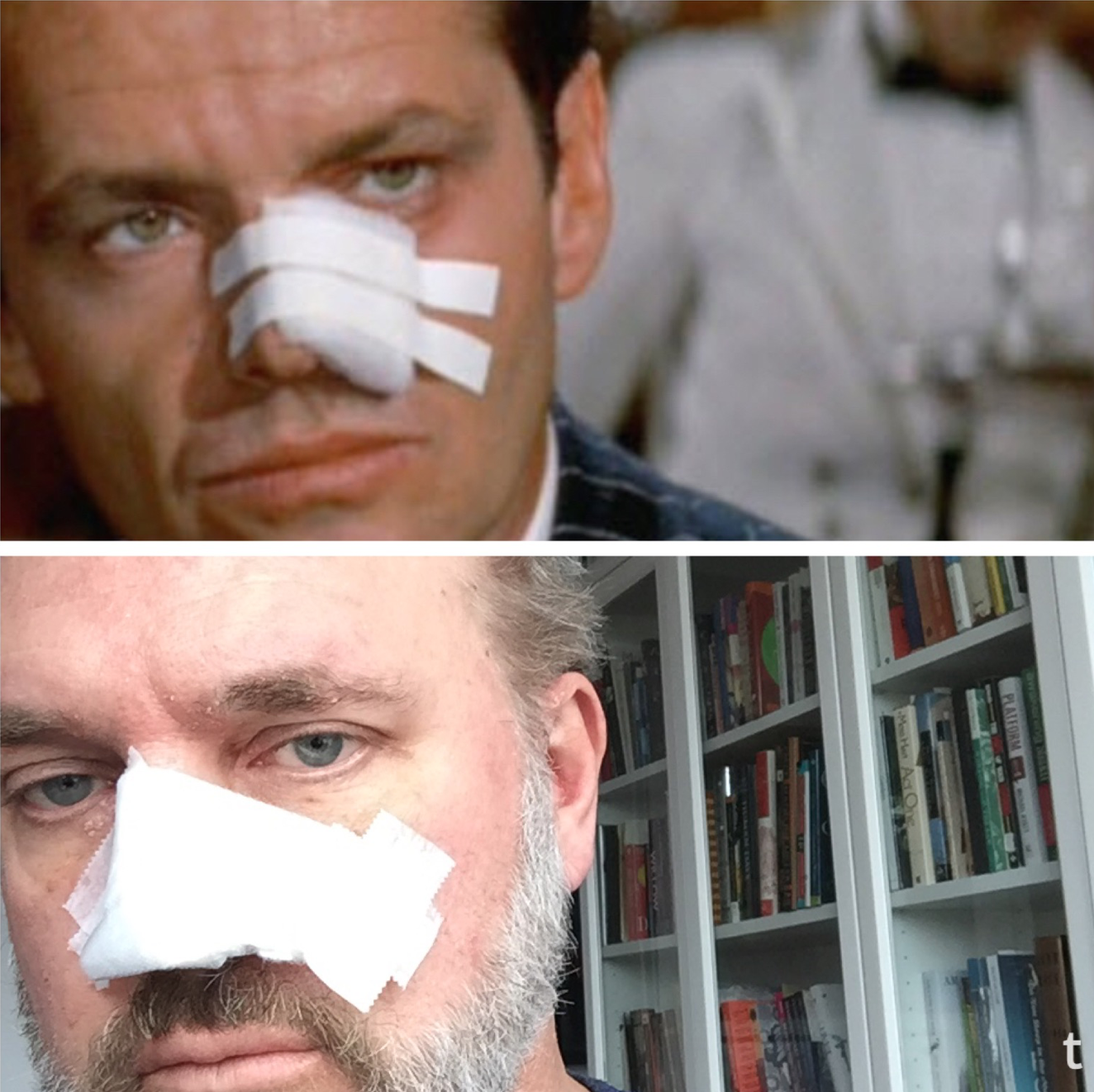After walking my dog Belle, I left my building one early morning this August as my usual self, only to return 3 hours later with bandages all over my face along with two black eyes.
(especially if there are bandages involved!)
I’d had the most minor basal skin cell carcinoma removed on my nose and although my surgeon had mostly warned me, I had nonetheless drastically underestimated the impact of the procedure.
I thought since what was removed was so tiny that friends kept asking me “What are they removing…I really can’t see anything?” that this would be a quick zap of a laser and then I’d have a small band-aid on for a day or two.
Instead, despite the fact that they were removing something that was pretty much invisible, it involved 46+ stitches across my nose.

(I also have a terrific photo of the post-surgery moment with exposed stitches but decided not to include it here. If you’re interested, just let me know.)
All in all, in the grand scheme of things it was an astonishingly minor affair: something tiny completely removed before it was a problem, a mostly painless procedure, and a convenient excuse to follow the surgeon’s orders and not exercise for 3 weeks.
In fact, by far the most interesting thing about this surgical adventure was the reaction of the majority of people in my building.
More specifically, the ABSENCE of a reaction, or even more accurately, the ability to share one.
You see, almost no one said anything to me.
I live in a truly vast building where there’s always a crew of people around the front desk and package room, plus building managers and cleaners and floating real estate agents roaming around the gigantic lobby all the time.
Thus, I found the fact that pretty much no one said anything to me very strange indeed.
I mean, I had left in the morning dashingly handsome only to returned a few hours later covered up like the Invisible Man.
Often, in the days afterwards, when I made eye contact with the usually friendly staff, I could see their quiet struggle about whether or not they should comment.
Their inner debate about whether it was more rude to ask or to remain silent was beyond obvious.
Was I a victim of some kind of awful crime…or had I suffered an unfortunate accident?
Or were they wondering perhaps if I’d opted for an extreme plastic surgery makeover and they’d be calling attention to it?
When someone did seem painfully at a loss of whether to respond or not, and it started getting awkward (like waiting at the elevator) I’d always simply mutter…
“Fight Club injury”
and let it go at that.
Anyway, at the same time I’d begun researching a major new offering for an enormous online platform I’m working with for the first time about resilience. (More on that this fall).
One of the things in the research deck I’m going through are the statements people say and the statements we like to hear during traumatic times.
I don’t fully jive with the data since in truth I never felt this was a particularly difficult experience for me.
It had absolutely no lasting or significant health, physical or financial consequences for me, and thus it was more like a 3-week inconvenience.
Even so, I did begin to think how strange it was that we live in a world where people in the periphery of our lives are often too afraid to ask “Are you OK?”–or better yet “Let me know if there’s anything I can do to help”–and instead choose to remain silent.
Here’s the thing I’ve definitely learned:
It’s better to fumble a bit and express concern, to react to what’s happening in some simple honest way, rather than to pretend you can’t see what’s going on right in front of your eyes.
Address the elephant in the room, in other words…or in this case, the Fight Club survivor.
Basically, Empathy transcends Awkwardness.
Namaste for Now,
Edward
P.S. The other thing I learned…and this is truly major:
ALWAYS WEAR SUNSCREEN!

